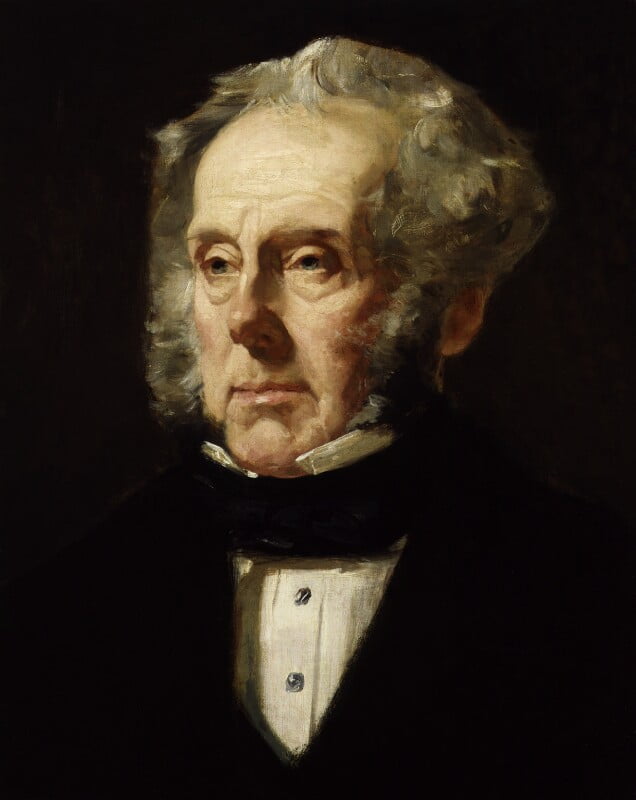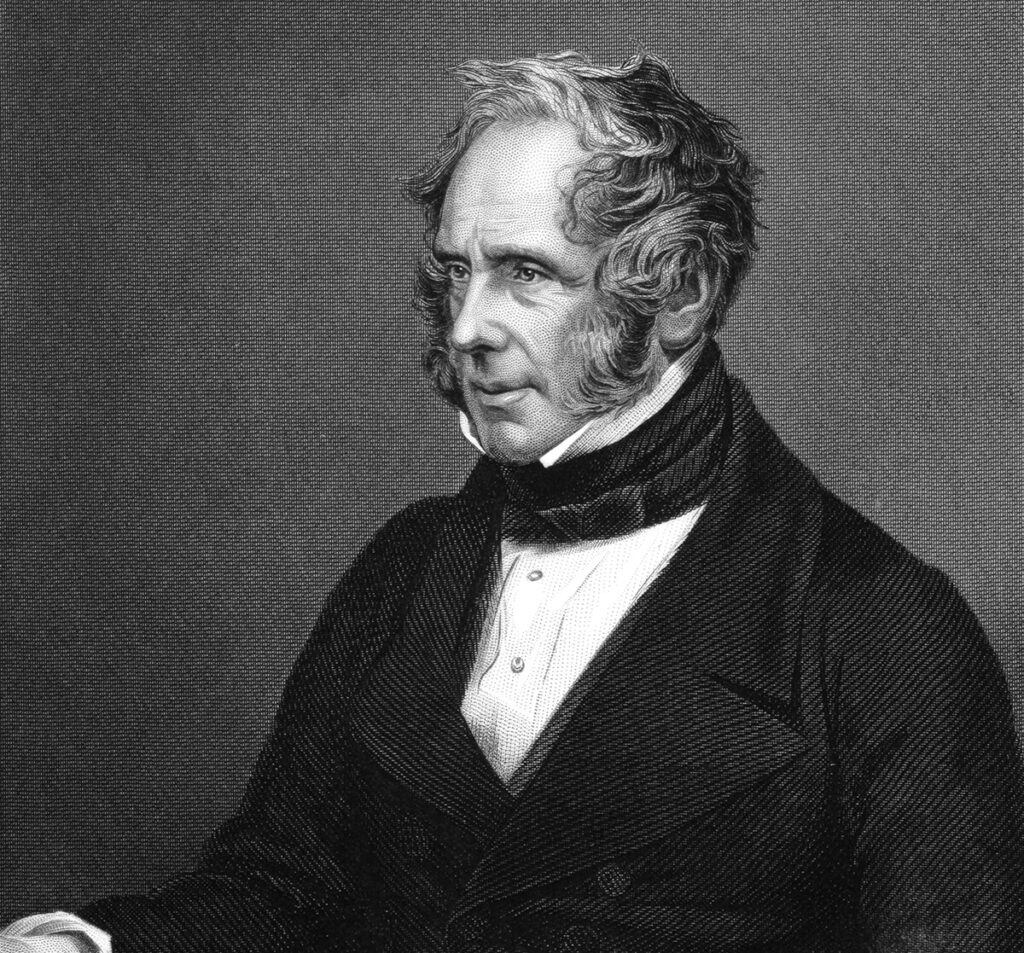Henry John Temple, 3rd Viscount Palmerston
Liberal Party
Image credit: Henry John Temple, 3rd Viscount Palmerston, Francis Cruikshank, circa 1855-1859. © National Portrait Gallery, London licensed under CC BY-NC-ND 3.0
Henry John Temple, 3rd Viscount Palmerston
…whether, as the Roman… so also a British subject, in whatever land he may be, shall feel confident that the watchful eye and the strong arm of England will protect him against injustice and wrong.
Liberal Party
February 1855 - February 1858
6 Feb 1855 - 19 Feb 1858
|June 1859 - October 1865
|12 Jun 1859 - 18 Oct 1865

Image credit: Henry John Temple, 3rd Viscount Palmerston, Francis Cruikshank, circa 1855-1859. © National Portrait Gallery, London licensed under CC BY-NC-ND 3.0
Key Facts
Tenure dates
6 Feb 1855 - 19 Feb 1858
12 Jun 1859 - 18 Oct 1865
Length of tenures
9 years, 141 days
Party
Liberal Party
Spouse
Emily Lamb
Born
20 Oct 1784
Birth place
Westminster, Middlesex, England
Died
18 Oct 1865 (aged 80 years)
Resting place
Westminster Abbey
About The Viscount Palmerston
Lord Palmerston might have been the first truly popular British Prime Minister. Famous for his patriotism and unwavering commitment to protecting British interests, Palmerston was Prime Minister twice (1855-58, 1859-65). Always more interested in foreign affairs than domestic policy, he had a profound effect on European great power politics. Palmerston served in ministerial office for 46 years, a record for the modern era. He is also the most recent Prime Minister to have died in office.

Henry John Temple was born in Westminster in 1784. He succeeded his father’s Irish peerage in 1802, which did not allow him a place in the House of Lords but did bestow both a vast County Sligo estate and the title Lord Palmerston, by which he became known.
He was educated at Harrow, the University of Edinburgh, and St John’s College, Cambridge. He was a military volunteer during the anti-invasion preparations of 1803-05.
In 1806, he ran for the University of Cambridge constituency but was defeated. An attempt on the Horsham constituency later that year succeeded, only for Palmerston to be unseated by Parliament due to the returning officer’s impropriety. Undeterred, Palmerston was finally elected to the pocket borough of Newport on the Isle of Wight, in 1807 at the age of 22. He delivered a very impressive maiden speech, catching the attention of powerful men.
He was quickly appointed to a junior position in the Duke of Portland’s government, but his break came when Spencer Perceval appointed him Secretary of State for War in 1809. With the Napoleonic conflicts ongoing, this position had a critical administrative role as an auditor and Palmerston earned a reputation for arduous work in an often-tedious role. When Perceval was assassinated, Lord Liverpool retained Palmerston as War Secretary.
This was not a particularly successful period in Palmerston’s career. Though the Napoleonic Wars were won in 1815, he found himself increasingly at odds with the reactionary and repressive policies of Liverpool’s government. Nor was Liverpool particularly happy with his War Secretary and offered to move him to the House of Lords, and even to India as Governor-General, but Palmerston turned him down. In 1818, Palmerston survived an assassination attempt by a former soldier.
When Liverpool left the scene in 1827, Palmerston remained in Canning’s government, as he did in Goderich’s. But in May 1828, Goderich’s cabinet fractured when the ‘Canningites’ resigned. Palmerston went with them, and now, from the opposition benches, was able to speak more widely, creating a reputation for effective speaking.
When Wellington’s government fell, the Canningites joined the Whigs in government. Palmerston became Foreign Secretary, and he would remain in the post for 15 of the next 21 years (1830-34, 1835-41, 1846-51), serving Lord Grey, Lord Melbourne, and Lord John Russell’s governments. It was in this role that he excelled. Palmerston was a skilled diplomat and had a good understanding of foreign affairs. He also worked long hours and made sure to acquaint himself with all the goings on in the chancelleries of Europe.
As Foreign Secretary, he played a key role in the London Conference that led to international recognition of Belgium in 1831. He was not afraid to use Britain’s naval and economic strength to settle disputes. Most famously, in 1851, during the Don Pacifico affair he dispatched a navy squadron to blockade a Greek port after a failure to properly compensate a British merchant. He neatly encapsulated his foreign policy in a speech in 1848: ‘We have no eternal allies, and we have no perpetual enemies. Our interests are eternal and perpetual, and those interests it is our duty to follow’.
Palmerston’s increasingly brazen nationalism made him popular, and he was seen as sticking up for Britain. By the early 1850s he was probably the most popular politician in Britain and one of the first British politicians who cultivated popularity amongst the masses.
In 1851, Palmerston went too far, offering congratulations to Louis Napoleon after his military coup in Paris. Prime Minister Lord John Russell forced Palmerston’s resignation when Prince Albert accused him of not having shown the dispatch to the sovereign. Two months later, in early 1852, Palmerston had his revenge when he turned a vote on a militia bill into a vote of confidence, which brought down Russell.
When Lord Aberdeen formed a government of Whigs and Peelites the following year, Palmerston returned to Cabinet, but now as Home Secretary. However, he still exerted a major influence on foreign affairs, and he was one of the main advocates of confronting Russia. When the Crimean War broke out in 1854, Palmerston played a key role in coordinating the conflict and forming war aims. Ultimately, with the fall of Aberdeen, Palmerston was the obvious candidate to replace him as Prime Minister, aged 71.
He insisted on better logistical support for the army, and supported Florence Nightingale’s efforts to improve the medical services. In September, French soldiers seized the Malakoff redoubt and the Russians abandoned Sevastopol. Satisfied, the coalition forces now chose to end the war. More wars followed with the Indian rebellion (1857-58) and the Second Opium War against China (1856-60).
Palmerston’s government was defeated on a Parliamentary motion over its China policy in 1857, and he chose to call an election. Ultimately, Palmerston won, gaining 50 seats and a comfortable majority. However, Palmerston resigned the following year after being defeated in the Commons on an effort to introduce legislation that his critics argued was influenced by French pressure.
The Derby government that followed was short lived, and though the Conservatives gained seats in the 1859 election, it was not enough to give them a majority. Out of office, the Whigs, Peelites, and Radicals put aside their differences to create a new Liberal Party. With the fall of Derby, Palmerston returned to the premiership in June 1859 aged 75.
Once again, Palmerston largely concerned himself with foreign policy, and disapproved of efforts to pass domestic reform. He decided on an overall policy of ‘wait and see’ in the American Civil War (1861-65), despite the offer of a joint Anglo-French mediation from Napoleon III. Eventually, Union military victories over 1862-63 shifted the strategic balance and the prospects of any British intervention dwindled.
He was also drawn into the Schleswig-Holstein affair, which, for all its complexities, saw Denmark unambiguously defeated by Prussia and Austria. Palmerston’s moderately pro-Danish policy was completely upturned.
Nevertheless, Palmerston was able to fight off an attempt to censure him in Parliament. In July 1865, he went to the country again, winning a clear majority over the Conservatives.
Palmerston earned the nickname ‘Lord Cupid’ during his 20s and would have a reputation for having affairs for his entire life – indeed, his notoriety contributed to his popularity and was associated with national virility. He married the prominent Whig hostess Emily Lamb in 1839 (with whom he had had an affair for two decades, and they only married after the death of her first husband in 1837). The marriage was a happy one, though decidedly ‘open’ for both parties. He had no legitimate children, though it is thought he had at least two illegitimate children.
Palmerston died in October 1865 of a fever (not in the midst of a romantic encounter, as the swiftly circulating rumours suggested). He received a state funeral. He is the most recent Prime Minister to have died in office.
Collections & Content
Andrew Bonar Law
Bonar Law was the shortest serving Prime Minister of the 20th Century, being in office for just 209 days. He was gravely ill when he t...
The Earl of Rosebery
Lord Rosebery was Gladstone’s successor and the most recent Prime Minister whose entire parliamentary career...
Arthur James Balfour
Arthur Balfour was Salisbury’s successor. He had a reputation as a good parliamentarian, a capable minister, and an excellent ta...
The Duke of Wellington
Wellington is a Prime Minister who is today largely remembered for achievements unrelated to his premiership. ...
The Duke of Grafton
The Duke of Grafton believed, according to Horace Walpole, that ‘the world should be postponed to a whore and a...
Benjamin Disraeli
Charming, brilliant, witty, visionary, colourful, and unconventional, Benjamin Disraeli (nicknamed ‘Dizzy’) was one of the greate...
Boris Johnson
Boris Johnson is one of the most charismatic and controversial politicians of the modern era. To supporters, he was an authentic voice wh...
The Earl Grey
Earl Grey was the great aristocratic reformer. His government passed the ‘Great Reform Act of 1832’, ending an entire e...


